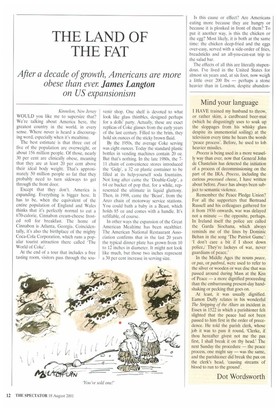Mind your language
I HAVE trained my husband to throw, or rather skim, a cardboard beer-mat (which he disgustingly uses to soak up the sloppages from his whisky glass despite its immemorial soiling) at the television every time he hears the words 'peace process'. Before, he used to lob heavier missiles.
Process is being used in a more weaselly way than ever, now that General John de Chastelain has detected the initiation of a process of decommissioning on the part of the IRA. Process, including the curious processed cheese, I have written about before. Peace has always been subject to semantic violence.
Remember the Peace Pledge Union? For all the supporters that Bertrand Russell and his colleagues gathered for it from 1936 onwards, war was delayed not a minute — the opposite, perhaps. In Ireland itself the police are called the Garda Siochana, which always reminds me of the lines by Dominic Behan in the song 'The Patriot Game': 'I don't care a bit if I shoot down police,/ They're lackeys of war, never guardians of peace.'
In the Middle Ages the nouns peace, or pax, or paxbred, were used to refer to the silver or wooden or wax disc that was passed around during Mass at the Kiss of Peace — a more dignified proceeding than the embarrassing present-day handshaking or pecking that goes on.
At least, it was usually dignified. Eamon Duffy relates in his wonderful The Stnpping of the Altars an incident in Essex in 1522 in which a parishioner felt slighted that the peace had not been passed to him first in the order of precedence. He told the parish clerk, whose job it was to pass it round, 'Clerke, if thou hereafter givest not me the pax first, I shall break it on thy head.' The next Sunday the procedure — the peace process, one might say — was the same, and the parishioner did break the pax on the clerk's head, 'causing streams of blood to run to the ground'.
Dot Wordsworth


























































 Previous page
Previous page